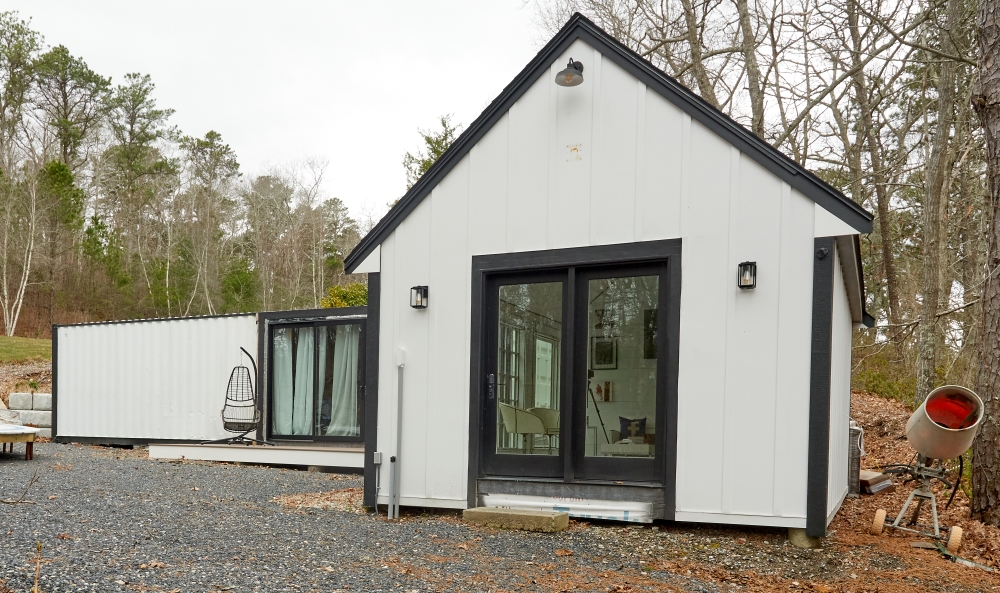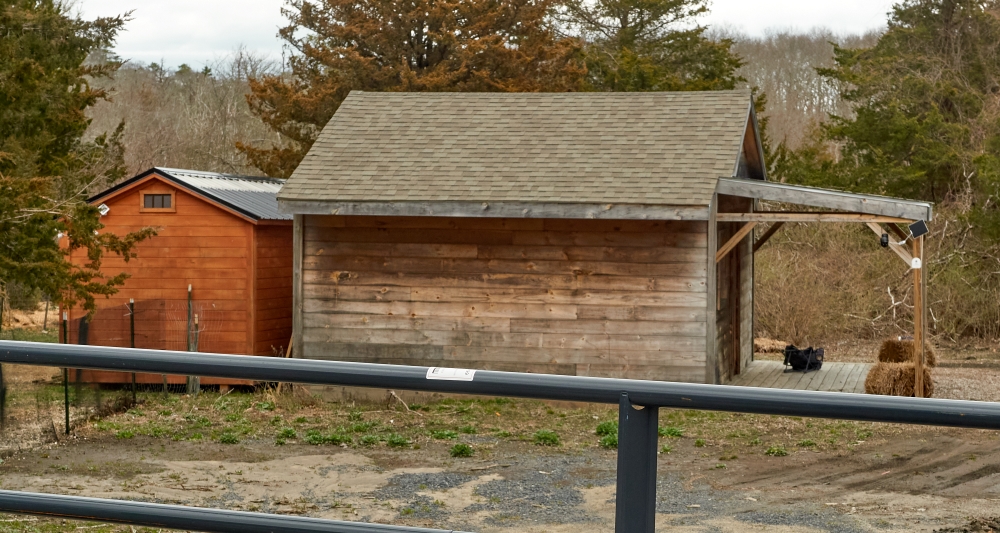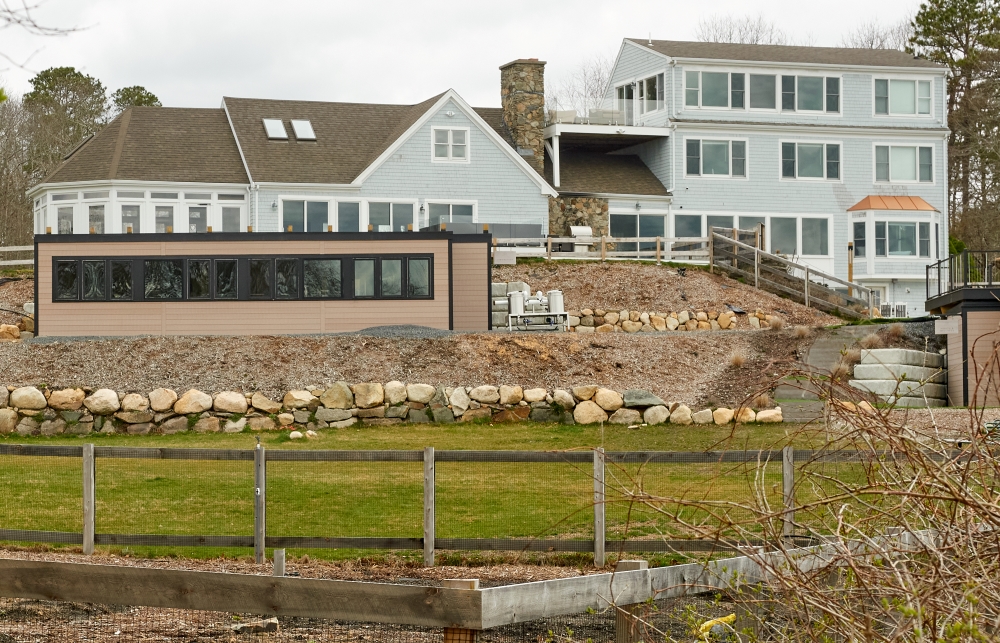The town has ordered the owner of a nonprofit known as The Farmhouse to stop using buildings on his 10-acre property to run educational programs, saying he lacks proper permits and violates the state’s fire code.
In recent weeks, Plymouth South High School, MAP Academy, and EdTV, the Plymouth Public Schools’ video education production program, have participated in events at The Farmhouse, which is on Center Hill Road in Ellisville.
Its owner, Paul Krasinski, 48, brother of actor John Krasinski, was sent two cease-and-desist orders by the town on March 26. The first one said he is in violation of the state building code for using his house for public or educational use without getting a permit and for putting up or altering several other buildings without getting a permit for public or educational use. Under that order, Krasinski was told to stop all public, business, and educational activities within any building or structure on the property and to file an application for a building permit by April 25.
The second order, from the Fire Department, said Krasinski was operating an educational facility in violation of fire safety codes. It also ordered him to halt all meetings, programs, and events on the property.
“We need to make sure that we have suitable access to the area if there is an emergency,” said Fire Chief Neil Foley. “It’s unfortunate that we got to this point where we had to send him a notice to make sure he’s in compliance.”
Foley said town inspectors went to The Farmhouse in March and discovered that one building was built on a neighbor’s property and another wasn’t far enough away from the property line to meet regulations for new construction.
“And that’s been going on for some time,” he said. “The town was looking to see if they could work something out with the neighbor, but given an ample amount of time, it didn’t look like that was going to happen.”
But in an interview with the Independent, Krasinski said he is trying to resolve the situation.
“We have been working very closely with town officials on building permits,” he said. “I think there was some kind of confusion as to whether we were hosting any of these programs out in these various buildings, which we did not.”
Krasinski said students did come inside the property’s main house as invited guests, but no programming was going on there.
Neighbor Josh Jordan says one of the buildings Krasinski put up, which he calls his Wellness Center, is partly built on Jordan’s land. Utility lines to another building Krasinski put up, which he calls the Biddle Barn, also run across his property, Jordan said.

In November, Nick Mayo, the town’s director of inspectional services wrote in an email to one of Krasinski’s neighbors that Krasinski had not applied for any educational use of his property. Mayo said he had met with Krasinski and was waiting for proper documentation for an educational use for the property, which would be allowed if Krasinski moved the structures – one of which is a container – away from his neighbors’ land, provided the plans allow the structures to be accessible to people with disabilities and otherwise meet building and fire codes.
Krasinski bought the property in 2021 for $1.75 million with a $1.59 million loan from the Small Business Administration, according to records at the Plymouth County Registry of Deeds. Initially, he used it for short-term rentals and as a venue for events such as weddings.
Krasinski said he used some of the proceeds from the sale of his software company, Carlisle-based Epicenter Experience, to build the campus at The Farmhouse.
Foley and Town Manager Derek Brindisi said town officials met with Krasinski on April 1 to discuss the situation.
“It was difficult to determine what type of operation he was running and because of that, we really wanted him to outline that so that we could give him more instructions on what he needed to do to comply with these requirements,” Brindisi said.
“We laid out our concerns to him,” Brindisi continued. “He acknowledged our concerns and then stated that he would make every effort to comply with the codes and regulations that the town requires.”
The property is zoned rural residential. Under Massachusetts law, educational institutions are allowed in areas zoned as residential, provided they meet with building and fire codes.
“What we stated multiple times with Mr. Krasinski is that although you state you’re operating an educational institution, we need to know exactly what you’re operating,” Brindisi said. Depending on that, he added, Krasinski may be subject to requirements such as sprinklers and accessibility for people with disabilities, and the size and quantity of restrooms.

Krasinski said he is not running an educational institution.
“It’s definitely not a school,” he said. “I think it’s more providing the learning spaces when we can’t be outside.”
Krasinski last held an event for the Plymouth Public Schools on April 10 – after the cease-and-desist orders were issued – when The Farmhouse hosted a film festival for EdTV. Jackie Bruno, a former NECN and NBC Boston anchor and reporter, spoke at the event. She said high school and middle school students were present. In all, Bruno said, more than 200 people were in attendance. She said Krasinski provided three tents and catering services.
During the event, Bruno said, Krasinski played an inspirational video from his actor brother. In it, John Krasinski said that if he can make movies, so can the students.
Bruno and Paul Krasinski were a couple at the time of the festival, but she said they have since broken up. Bruno said she did not know about the cease-and-desist orders when she spoke, and does not want to have anything more to do with The Farmhouse.
“Paul is using the town,” she said. “Paul is using the schools, the town, and people’s generosity and hope for opportunity to his advantage. I have since learned he cannot be trusted.”
Although The Farmhouse is a nonprofit, the property, owned by Krasinski – assessed by the town at $1.815 million – is not tax-exempt, according to the Plymouth tax collector’s office. He also is behind on paying real estate taxes, the office said. Krasinski did not respond to a request for comment on why he is in arrears. Town officials were unable to say how much is owed.
The precise purpose of The Farmhouse has been something of a mystery to many people. Krasinski established The Farmhouse Retreat Inc. in October 2021. In a filing with the Massachusetts secretary of state, he described the goal of the nonprofit as “engaging in educational activities that promote and inspire societal change to focus less on the self and more on serving others, the community, and the greater good through various means, included but not limited to:
- Convening diverse and creative people, using the experience, expertise, and knowledge of all, to work and learn together in one physical space to resolve the world’s most pressing problems;
- Using hands-on group experiences at the organization’s farm location to create deep relationships that will inspire positive social change and foster problem-solving; and
- Engaging in experimental learning with individuals and families in activities such as community-shared agriculture, aquaculture, renewable energy use, technology development, media production and culinary learning experiences.”
In June 2022, Krasinski received a letter from the Internal Revenue Service recognizing The Farmhouse as a public charity. That granted it a federal tax exemption and allowed it to receive tax-deductible contributions.
Krasinski said The Farmhouse currently has no revenue. He said he has two employees whom he pays out of his own pocket.
But when he used it for short-term rentals, he told guests that their payments were helping to fund the nonprofit.
For example, in an October 2022 Instagram post, he thanked people who had rented the property over the previous year.
“A sincere thank you to ALL of the families and companies that stayed at The Farmhouse over the past year, as your funds provided the seed capital for the initial changemaker projects and programming spotlighted on the website,” he wrote. “You are inspiring the future generation of changemakers in ways you were not even aware of!”
The next month, Krasinski reminded guests that they could continue to stay at The Farmhouse and that their payments would go to support the nonprofit.
“Did you know that in addition to being able to take in all that our extensive 10-acre property has to offer, the funds from your stay will be donated directly to our 501(c)3, which funds programming for youth and empowering these amazing changemakers?” he said in another Instagram post.
That same month, he announced the beginning of a collaboration with the Plymouth Public Schools.
Over the next few months, Krasinski announced “the first of many” interviews with Plymouth South High School’s PantherTV, his hosting of the Plymouth South Holiday Market, and the construction of new structures.
The Farmhouse no longer takes guests, Krasinski said, and is now directed entirely toward its nonprofit educational mission.
This past winter, students from Plymouth South High School and MAP Academy attended programs at The Farmhouse.
“We were asked by Plymouth Public Schools and the MAP Academy charter school to host winter programming for their kids,” Krasinski said.
Plymouth South students took part in a six-week program with a Plymouth South staff member, said principal Patricia Fry. Krasinski said eight students from Plymouth South took part in the program. Fry said the school does not have any current programs at The Farmhouse.
Krasinski said the programs exposed students to nature through walks around the property with the Massachusetts Audubon Society, and by exposing them to the farm, which includes chickens and a greenhouse where students could learn about growing microgreens. He said they also learned to plant potatoes and rye.
“How do we grow it?” Krasinski said, explaining what he was teaching students. “How do we pick it? How do we harvest it? How do we put it into boxes? What are the ingredients in these recipes that we can make? That was really what we were doing with MAP Academy and Plymouth Public Schools.”
MAP Academy, a charter school for students ages 14 to 24 for whom conventional high school has not worked, had 10 to 12 students attending a program, which the co-founder of the charter school, Rachel Babcock, said was well-run. She said students were on site, mostly outdoors, and were always with at least one instructor from MAP Academy for an hour a week during the first four weeks of what was to be an eight-week program. Babcock said that when she received word of the town’s cease-and-desist letter, MAP Academy immediately halted its participation.

Krasinski said he applied for a building permit, but Foley said Thursday that he was not aware of Krasinski addressing any of the problems cited in the cease-and-desist orders.
Still, Brindisi is holding out hope that Krasinski will address the outstanding issues.
“We’re hoping that he can get things back in order so that he can operate this facility which he has a lot of great vision for, so we’re looking forward to that day where he complies, and he can get back up into operation,” Brindisi said.
Independent staff reporter Andrea Estes contributed to this report. Fred Thys can be reached at fred@plymouthindependent.org

